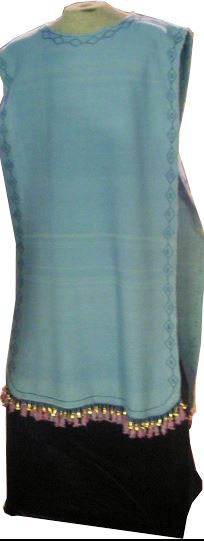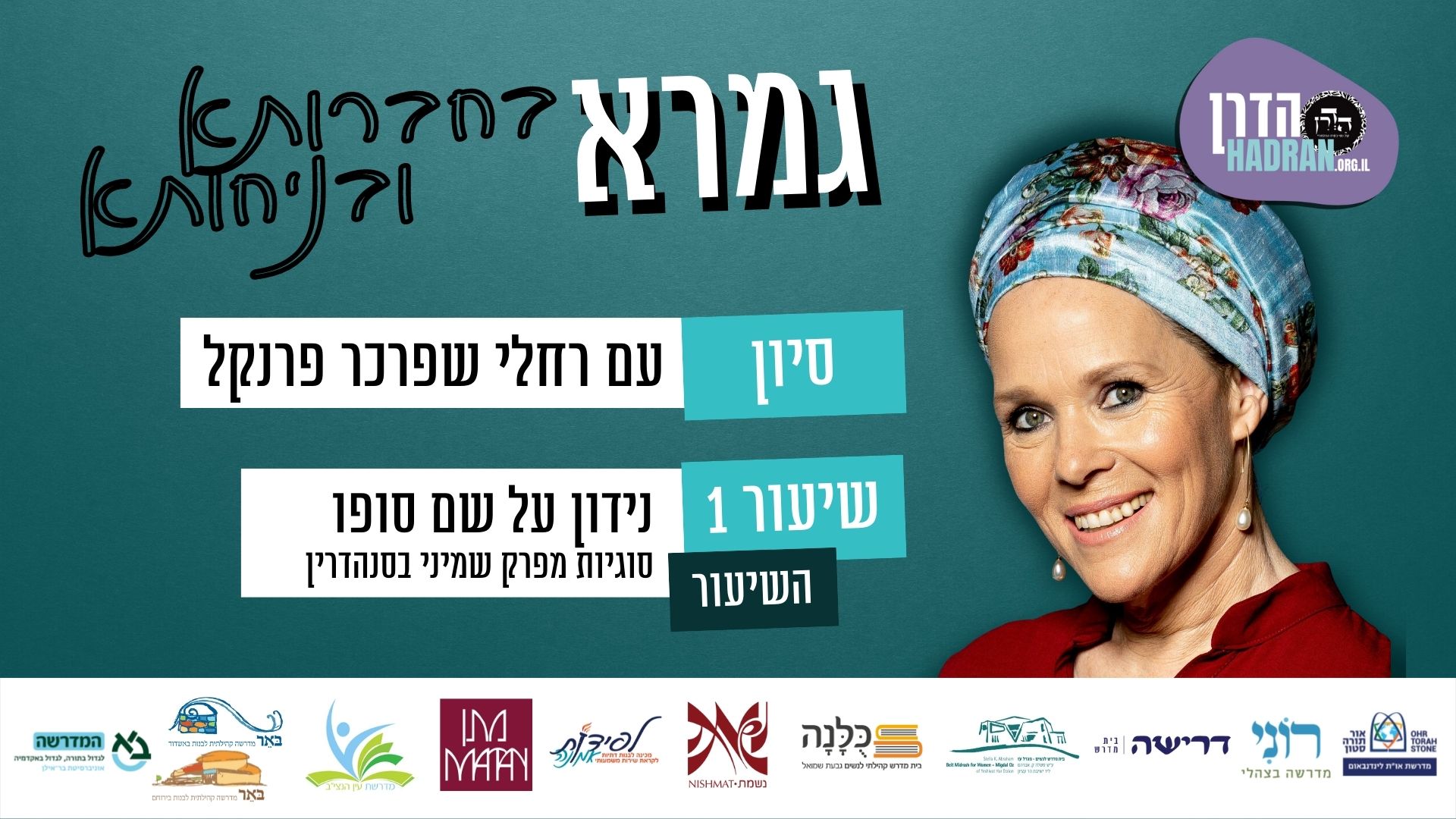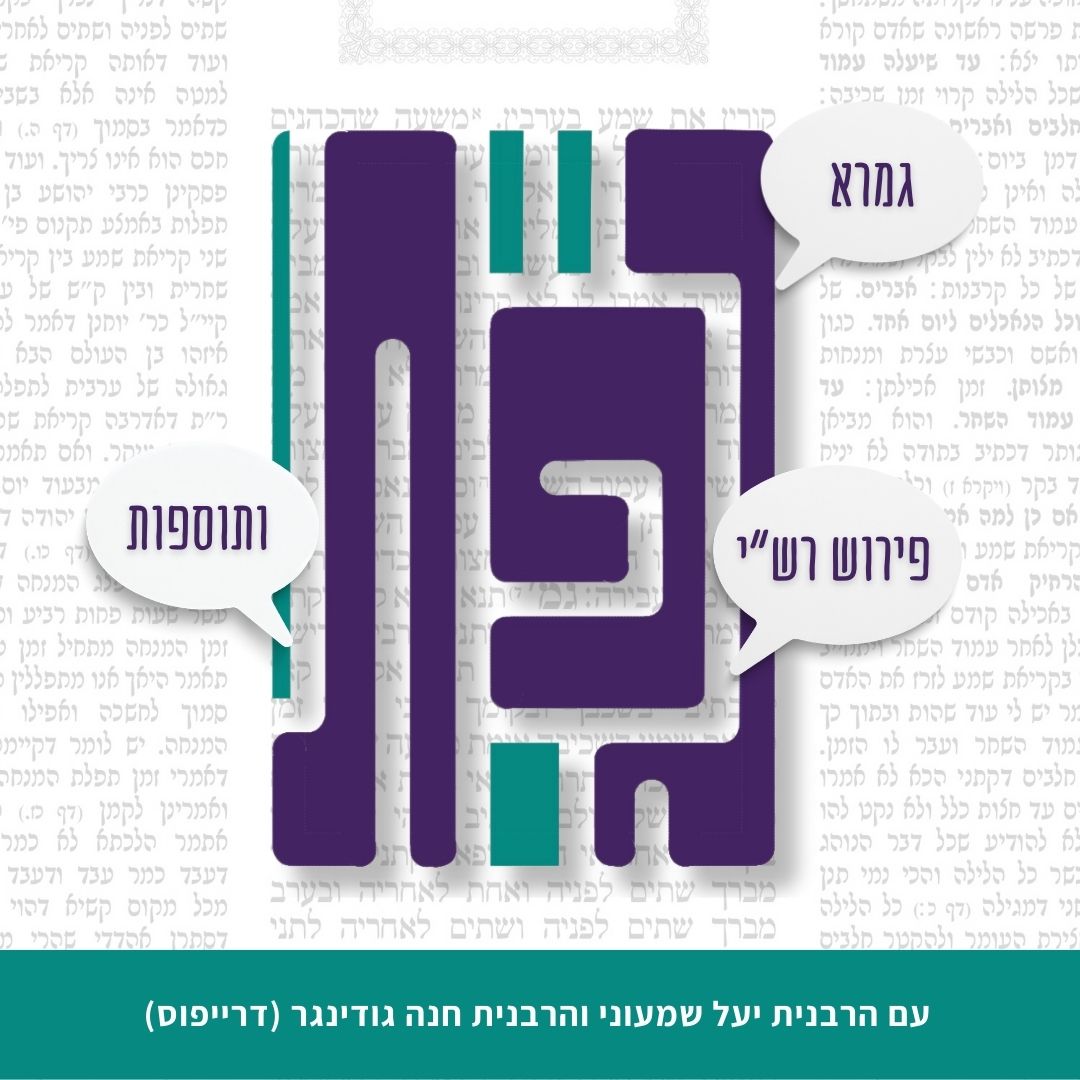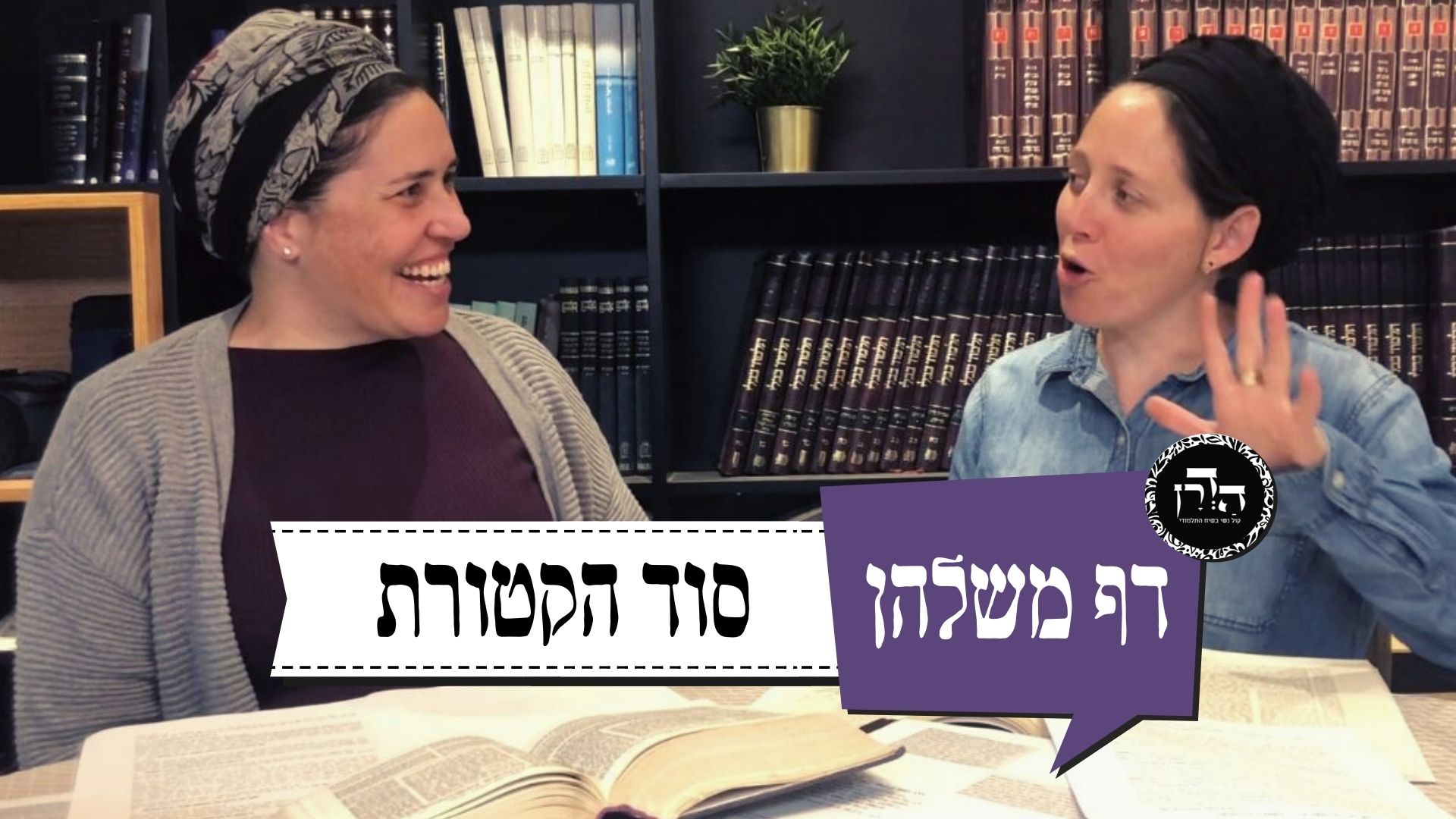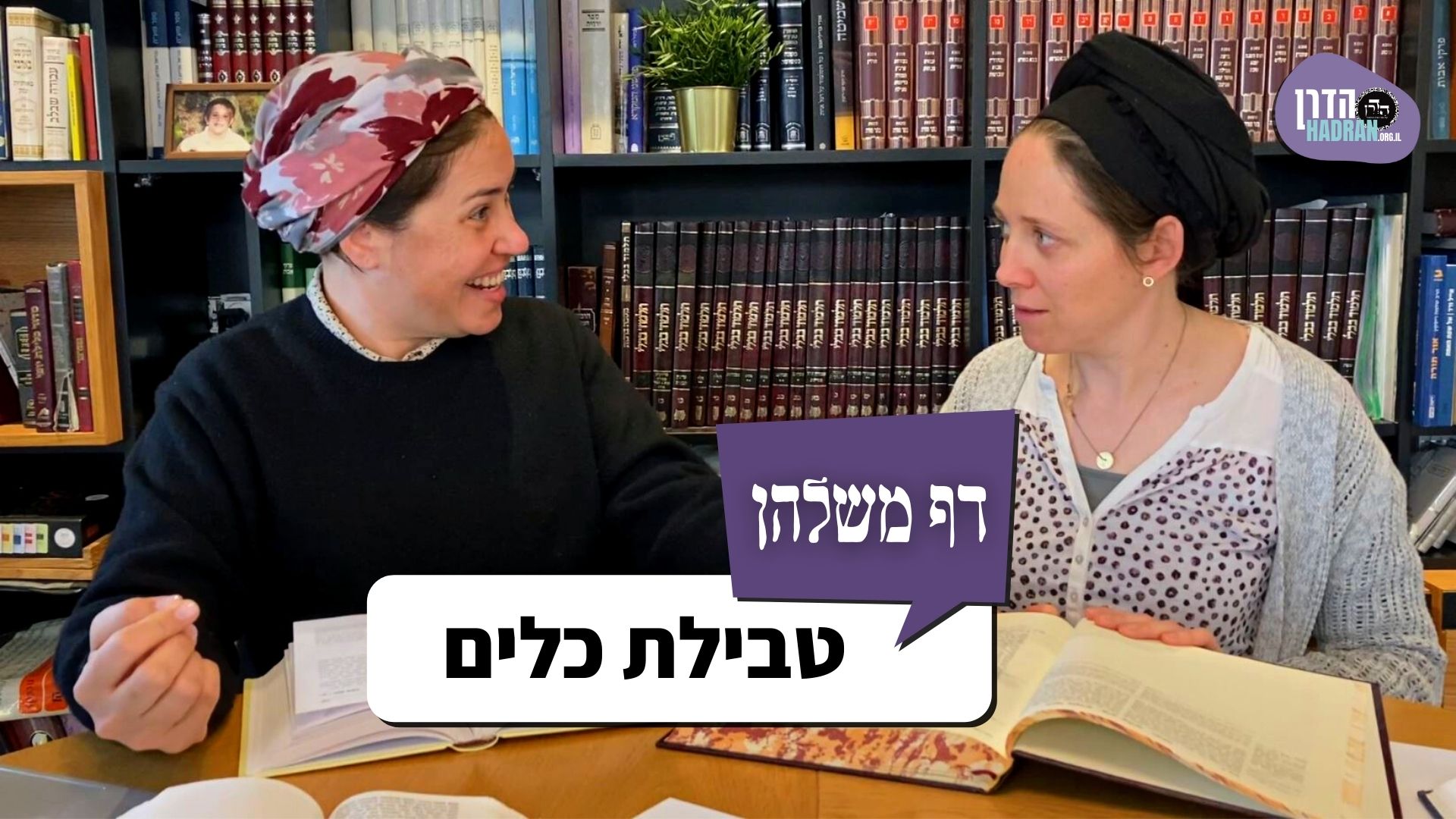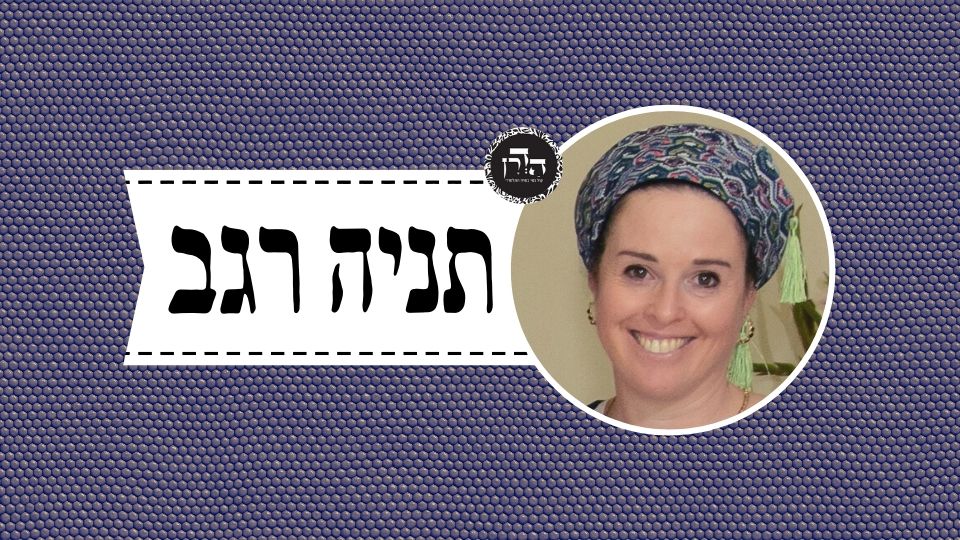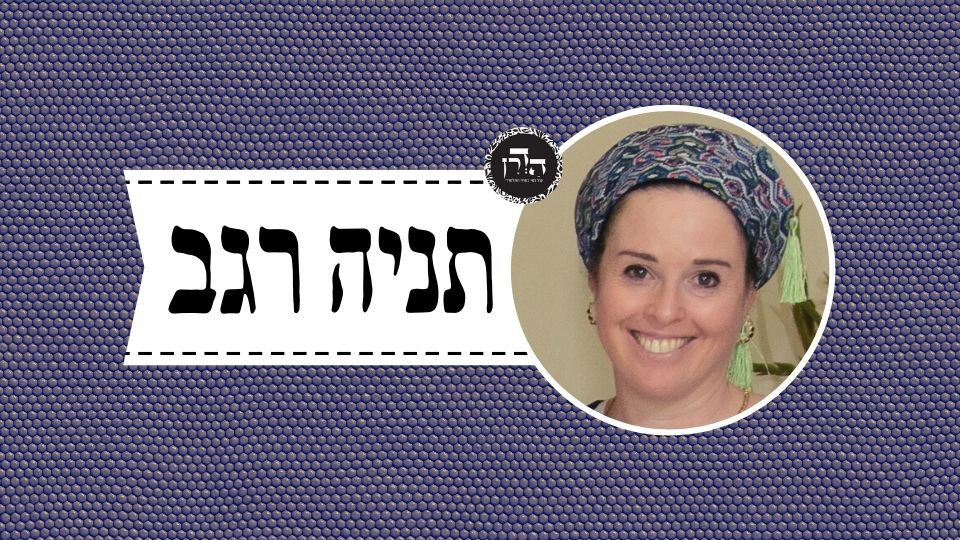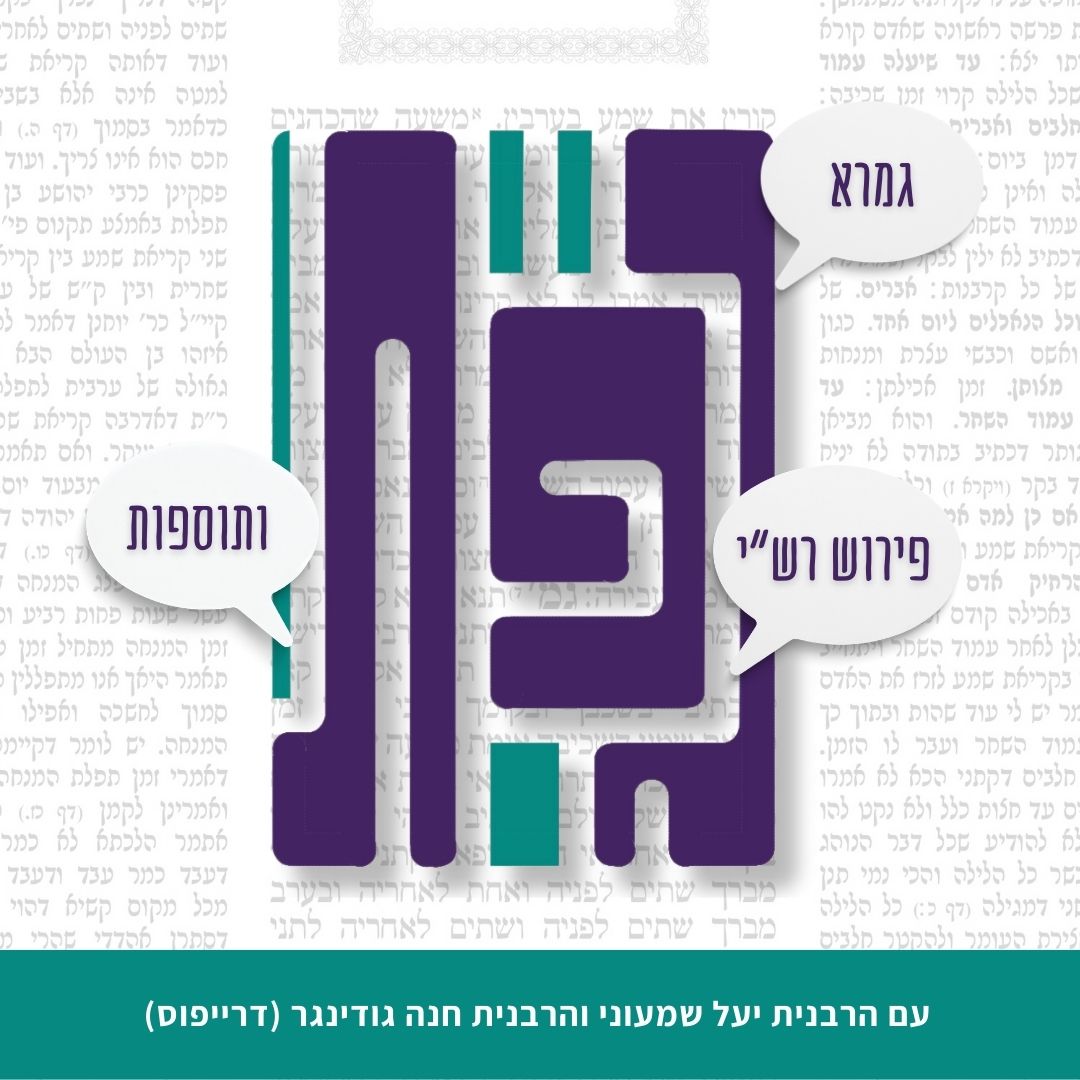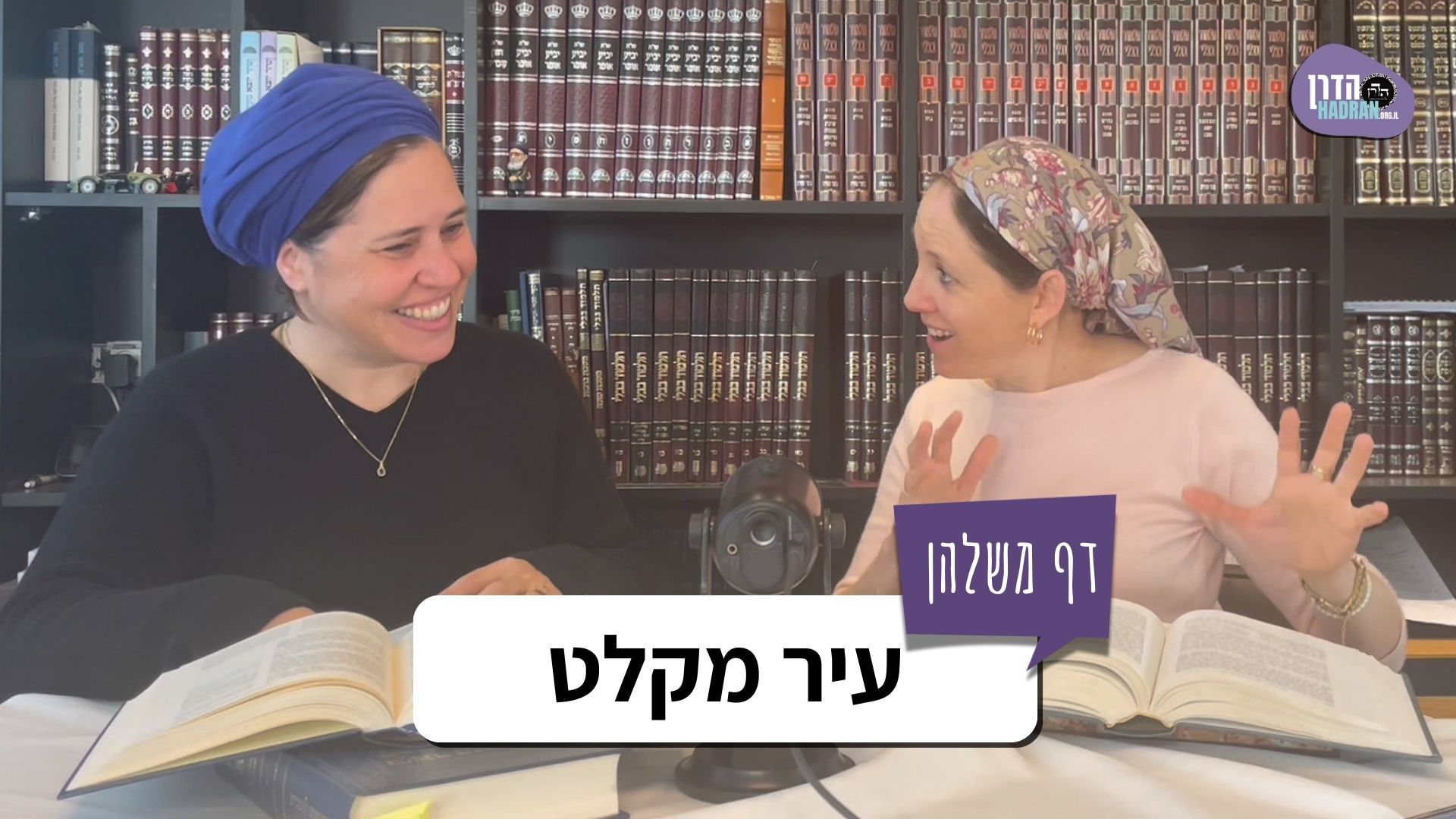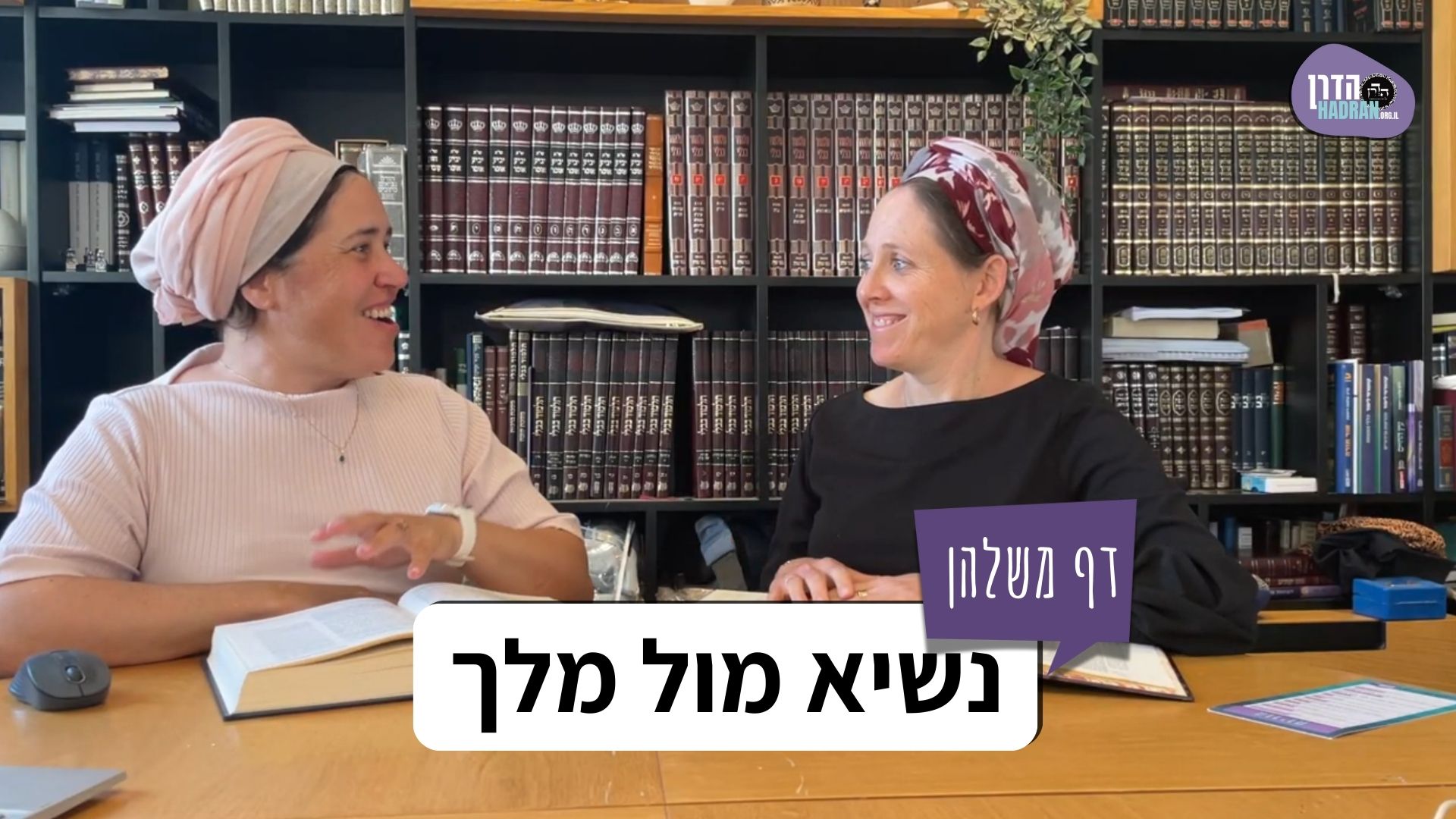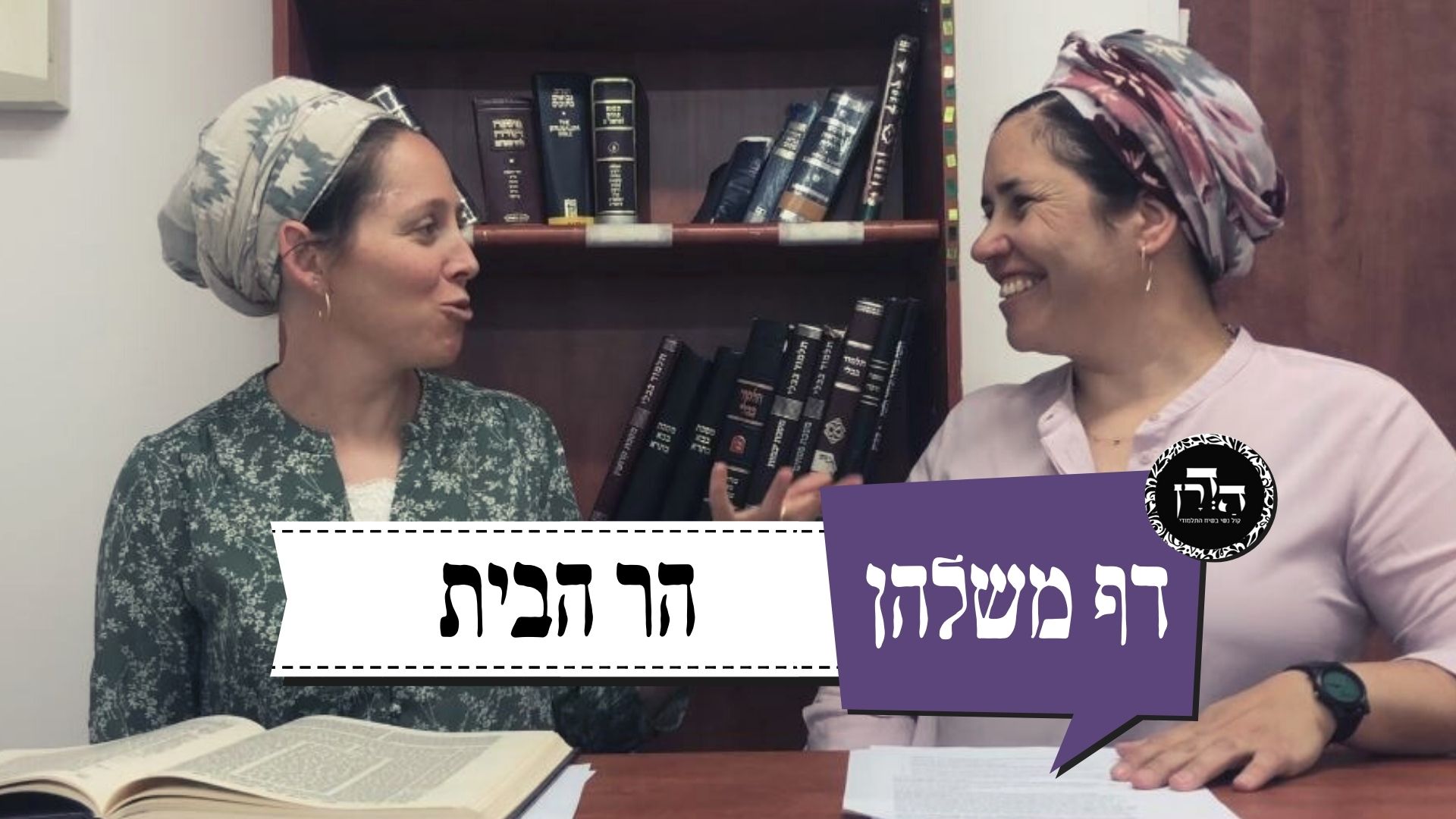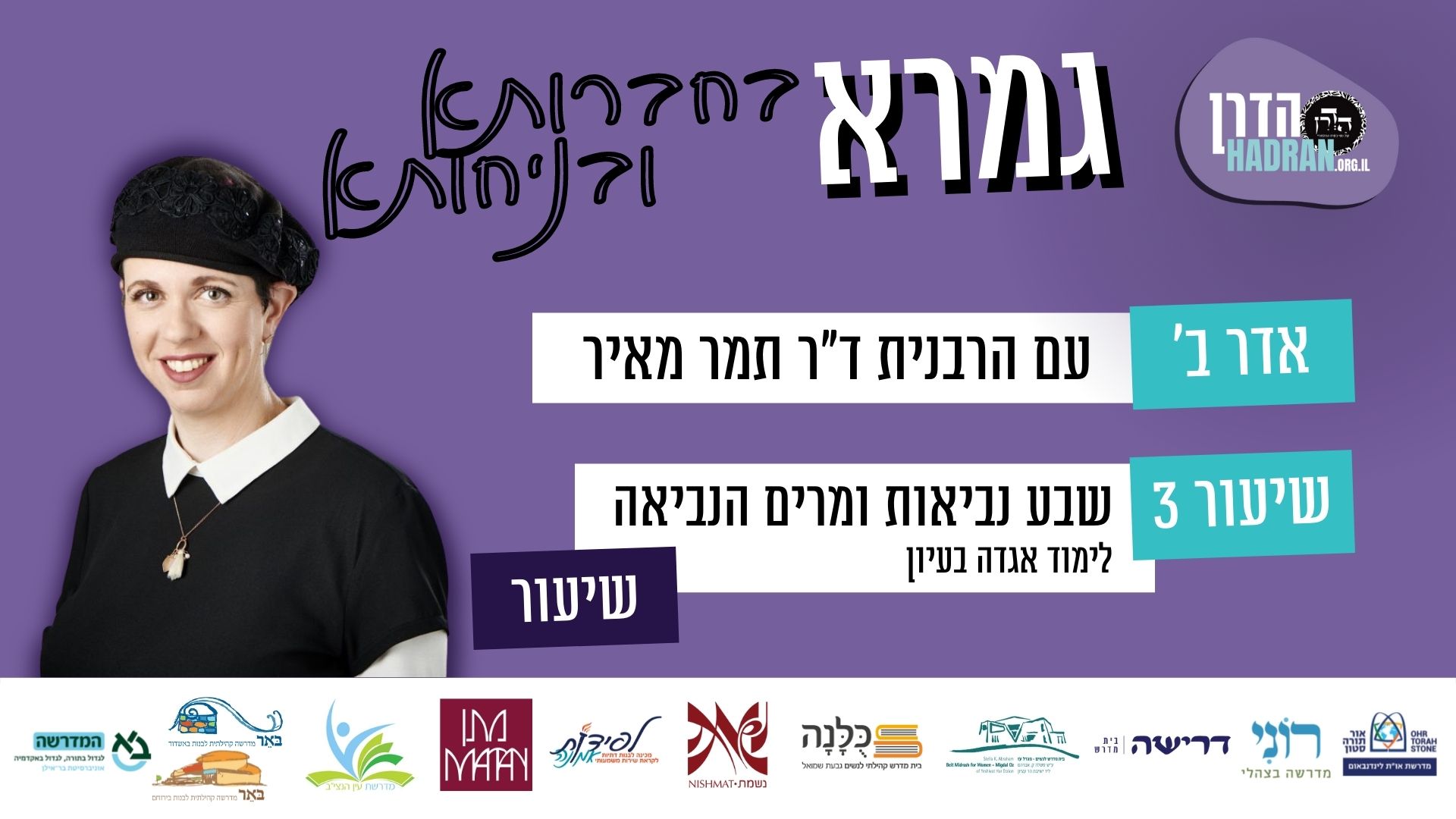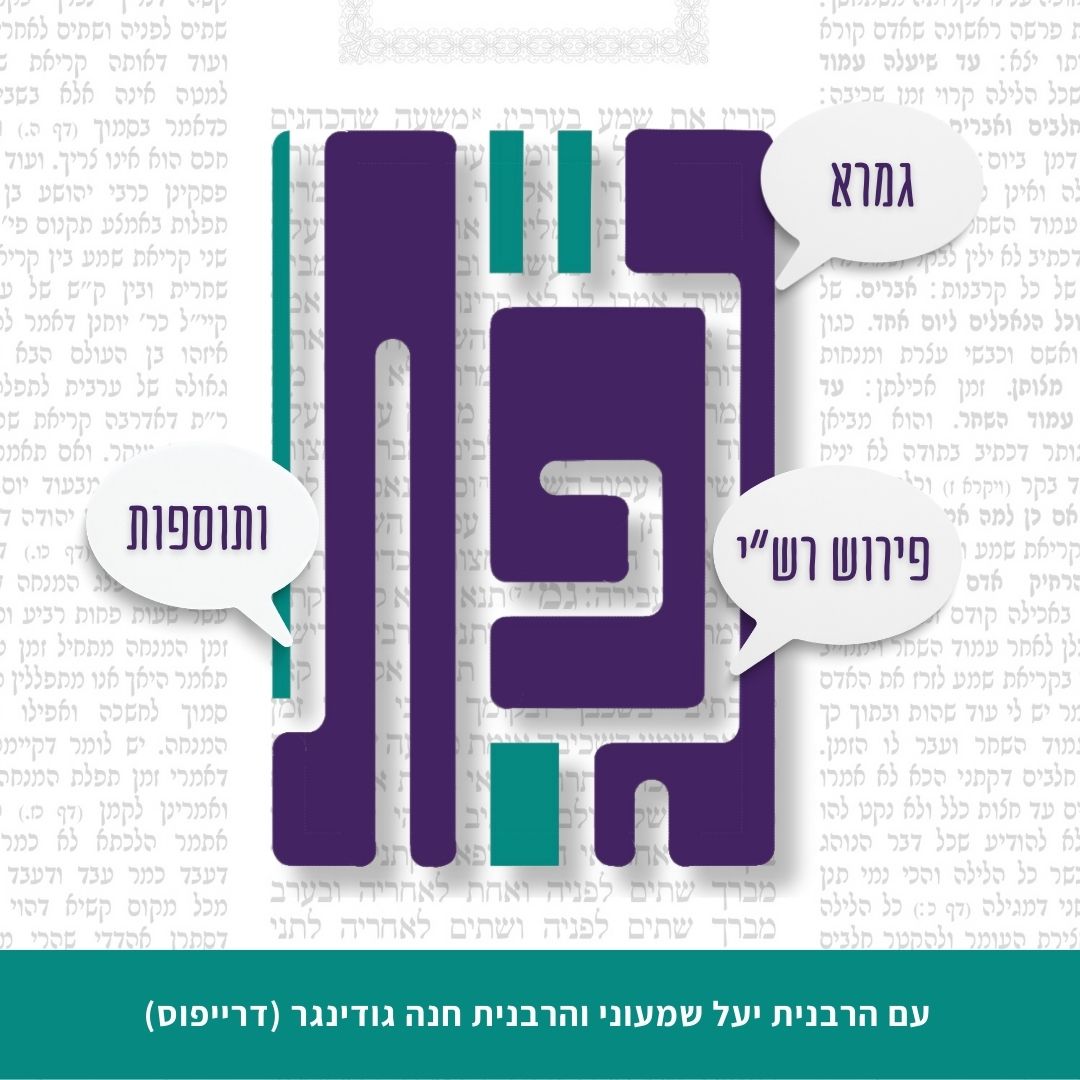באיזה מקומות עדיף לא לטבול או אי אפשר לטבול? הגמרא דנה בדיני חציצה – באיזה מקרים יש לחשוש שהיתה חציצה אפילו אם לא רואים שום דבר לאחר שטובלים? מה נחשב חציצה מהתורה? מה נחשב חציצה מדרבנן? מה אמור להיות צרות הגוף כשטובלים? האם אפשר לטבול ביום השמיני בשעות היום? ביום השביעי בשעות היום? האם אפשר שיהיה הפרש של יום, יומיים, שלושה ימים בין החפיפה לטבילה?
רוצה להקדיש שיעור?
כלים
העמקה
רוצה להבין מה באמת קורה מתחת לפני השטח של הסוגיה?
שיעורים, פודקאסטים והרחבות של מיטב המורות שלנו יפתחו לך עוד זוויות וכיווני חשיבה.
חדשה בלימוד הגמרא?
זה הדף הראשון שלך? איזו התרגשות עצומה! יש לנו בדיוק את התכנים והכלים שיעזרו לך לעשות את הצעדים הראשונים ללמידה בקצב וברמה שלך, כך תוכלי להרגיש בנוח גם בתוך הסוגיות המורכבות ומאתגרות.
פסיפס הלומדות שלנו
גלי את קהילת הלומדות שלנו, מגוון נשים, רקעים וסיפורים. כולן חלק מתנועה ומסע מרגש ועוצמתי.
נדה סז
בְּנָמֵל, אַף עַל גַּב דְּהַשְׁתָּא לֵיכָּא — אֵימַר בְּרִדְיוֹנֵי נְפַל.
in a port [banamal], where the boats are drawn up onto shore, as there is a lot of mud there, which can stick to her and interpose between her and the water. Even though now, after the immersion, there is no mud stuck to her feet or body, one can say that perhaps while she walked back after immersing the mud fell off. Since one cannot be certain that there was no mud stuck to her body while she immersed, she may not immerse in a port.
אֲבוּהּ דִּשְׁמוּאֵל עֲבַד לִבְנָתֵיהּ מִקְוָואוֹת בְּיוֹמֵי נִיסָן, וּמַפָּצֵי בְּיוֹמֵי תִּשְׁרֵי.
The Gemara relates that Shmuel’s father prepared ritual baths for his daughters in the days of Nisan, by digging holes and letting them fill with natural rainwater, and he placed mats in the Euphrates River in the days of Tishrei. Since the water was shallow and the riverbed was muddy, he placed mats on the riverbed so that they could immerse without getting dirty.
אָמַר רַב גִּידֵּל, אָמַר רַב: נָתְנָה תַּבְשִׁיל לִבְנָהּ, וְטָבְלָה וְעָלְתָה — לֹא עָלְתָה לָהּ טְבִילָה, אַף עַל גַּב דְּהַשְׁתָּא לֵיכָּא, אֵימַר בְּרִדְיוֹנֵי נְפַל.
The Gemara cites a similar halakha involving the interposition of an item during immersion. Rav Giddel says that Rav says: If a woman gave a cooked dish to her son, and afterward she immersed in a ritual bath and ascended from the ritual bath, the immersion is ineffective for her. The reason is that even though now, after the immersion, there is no food stuck to her body, one can say that perhaps as she walked back after immersing the food fell off. Since one cannot be certain that there was no food stuck to her body while she immersed, she should not handle food immediately before immersing.
אָמַר רָמֵי בַּר אַבָּא: הָנֵי רִבְדֵי דְּכוּסִילְתָּא, עַד תְּלָתָא יוֹמֵי — לָא חָיְיצִי, מִכָּאן וְאֵילָךְ — חָיְיצִי.
Rami bar Abba said: With regard to these bloodletting incisions [ravdei dekhusilta], until three days have passed since the bloodletting, when they have not yet formed a hard scab, they do not interpose and invalidate an immersion. From this point forward they interpose, as the scab is too hard for the water to penetrate.
אָמַר מָר עוּקְבָא: לִפְלוּף שֶׁבָּעַיִן, לַח — אֵינוֹ חוֹצֵץ, יָבֵשׁ — חוֹצֵץ. אֵימָתַי נִקְרָא יָבֵשׁ? מִשָּׁעָה שֶׁמַּתְחִיל לִירַק.
Mar Ukva said: With regard to mucus that is in the eye, if it is moist, it does not interpose and invalidate an immersion. But if the mucus is dry and hard it interposes. When is it called dry? It is called dry from the time that it begins to turn yellow.
אָמַר שְׁמוּאֵל: כְּחוֹל שֶׁבְּתוֹךְ הָעַיִן — אֵינוֹ חוֹצֵץ, וְשֶׁעַל גַּבֵּי הָעַיִן — חוֹצֵץ. אִם הָיוּ עֵינֶיהָ פּוֹרְחוֹת — אֲפִילּוּ עַל גַּבֵּי הָעַיִן אֵינוֹ חוֹצֵץ.
Shmuel says: Eye shadow that is in the eye does not interpose and invalidate an immersion. But eye shadow that is on or around the eye interposes. And if the woman’s eyes were constantly blinking, then even eye shadow that is on or around the eye does not interpose, as the constant blinking removes the eye shadow.
אָמַר רַבִּי יוֹחָנָן: פָּתְחָה עֵינֶיהָ בְּיוֹתֵר, אוֹ עַצְמָהּ עֵינֶיהָ בְּיוֹתֵר — לֹא עָלְתָה לָהּ טְבִילָה.
Rabbi Yoḥanan says: If a woman opened her eyes very wide or closed her eyes very tightly while immersing, this immersion is ineffective for her. Such open or closed eyelids prevent the water from reaching the creases around the eyes.
אָמַר רֵישׁ לָקִישׁ: הָאִשָּׁה לֹא תִּטְבּוֹל אֶלָּא דֶּרֶךְ גְּדִילָתָהּ, כְּדִתְנַן: הָאִישׁ נִרְאָה כְּעוֹדֵר וּמוֹסֵק זֵיתִים, אִשָּׁה נִרְאֵת כְּאוֹרֶגֶת וְכִמְנִיקָה אֶת בְּנָהּ.
Reish Lakish says: A woman may immerse herself in a ritual bath only in the manner that she grows, i.e., she may not force her arms to her sides or close her legs tightly. She is not obligated to spread her limbs widely, but simply stand in her normal manner. As we learned in a mishna (Nega’im 2:4): When a man has a leprous mark between his legs and stands before a priest for inspection, he should appear like one who is hoeing, i.e., with his legs slightly apart, and if it is under his arm, he should appear like one who is harvesting olives, with his arms slightly raised. If the mark is not visible when he is standing in that manner, it is not impure. By contrast, a woman with a leprous mark between her legs should appear like one who is weaving, and if the mark is beneath her breast she should appear like a woman who is nursing her son.
אָמַר רַבָּה בַּר רַב הוּנָא: נִימָא אַחַת קְשׁוּרָה חוֹצֶצֶת,
Rabba bar Rav Huna says: A single hair tied in a knot interposes and invalidates an immersion.
שָׁלֹשׁ אֵינָן חוֹצְצוֹת, שְׁתַּיִם אֵינִי יוֹדֵעַ. וְרַבִּי יוֹחָנָן אָמַר: אָנוּ אֵין לָנוּ אֶלָּא אַחַת.
Three hairs tied together in a knot do not interpose, as three hairs cannot be tied so tightly that water cannot penetrate them. With regard to two hairs tied together in a knot, I do not know the halakha. And Rabbi Yoḥanan says: We have a tradition that only one hair interposes, but two or more do not prevent the water from reaching the body.
אָמַר רַבִּי יִצְחָק: דְּבַר תּוֹרָה, רוּבּוֹ הַמַּקְפִּיד עָלָיו — חוֹצֵץ, רוּבּוֹ וְאֵינוֹ מַקְפִּיד עָלָיו — אֵינוֹ חוֹצֵץ, וְגָזְרוּ עַל רוּבּוֹ שֶׁאֵינוֹ מַקְפִּיד מִשּׁוּם רוּבּוֹ הַמַּקְפִּיד, וְגָזְרוּ עַל מִיעוּטוֹ הַמַּקְפִּיד מִשּׁוּם רוּבּוֹ הַמַּקְפִּיד.
§ Rabbi Yitzḥak says: By Torah law, if there is an interposition between a person and the water, and it covers the majority of his body, and he is particular and wants the interposing substance removed, it interposes and invalidates an immersion in a ritual bath. But if it covers the majority of his body but he is not particular about that substance, it does not interpose. But the Sages issued a decree prohibiting substances covering the majority of his body with regard to which he is not particular, due to substances covering the majority of his body about which he is particular. And likewise, they issued a decree against substances covering the minority of his body with regard to which he is particular, due to substances covering the majority of his body about which he is particular.
וְלִגְזוֹר נָמֵי עַל מִיעוּטוֹ שֶׁאֵינוֹ מַקְפִּיד, מִשּׁוּם מִיעוּטוֹ הַמַּקְפִּיד! הִיא גּוּפַהּ גְּזֵרָה, וַאֲנַן נֵיקוּם וְנִגְזוֹר גְּזֵרָה לִגְזֵרָה?!
The Gemara raises a difficulty: But let them also issue a decree prohibiting substances covering the minority of his body with regard to which he is not particular, due to substances covering the minority of his body about which he is particular. The Gemara answers: The Sages did not issue such a decree, as that prohibition is itself a rabbinic decree, and will we arise and issue a decree to prevent the violation of another decree?
אָמַר רַב: נִדָּה בִּזְמַנָּהּ אֵינָהּ טוֹבֶלֶת אֶלָּא בַּלַּיְלָה, וְשֶׁלֹּא בִּזְמַנָּהּ טוֹבֶלֶת בֵּין בַּיּוֹם בֵּין בַּלַּיְלָה. רַבִּי יוֹחָנָן אָמַר: בֵּין בִּזְמַנָּהּ בֵּין שֶׁלֹּא בִּזְמַנָּהּ אֵינָהּ טוֹבֶלֶת אֶלָּא בַּלַּיְלָה, מִשּׁוּם סֶרֶךְ בִּתָּהּ.
§ The Gemara returns to discuss the issue of the correct time for immersion. Rav says: A menstruating woman who wishes to immerse to complete her purification process at her time, i.e., at the end of seven days, may immerse only at night, i.e., on the night after the seventh day, the night of the eighth day. But a woman who wishes to immerse not at her time, i.e., on the eighth day or afterward, may immerse either during the day or at night. Rabbi Yoḥanan says: Whether she is immersing at her time or not at her time, she may immerse only at night. This is because her daughter might follow her example when she is old enough, and also immerse in the daytime, but she may do so on the seventh day, when immersion is not valid.
וְאַף רַב הֲדַר בֵּיהּ, דְּאָמַר רַבִּי חִיָּיא בַּר אָשֵׁי אָמַר רַב: נִדָּה, בֵּין בִּזְמַנָּהּ בֵּין שֶׁלֹּא בִּזְמַנָּהּ, אֵינָהּ טוֹבֶלֶת אֶלָּא בַּלַּיְלָה, מִשּׁוּם סֶרֶךְ בִּתָּהּ.
And even Rav retracted his opinion and ruled that a woman who is immersing after menstruation may never do so during the day. As Rabbi Ḥiyya bar Ashi said that Rav said: A menstruating woman who wishes to immerse to complete her purification process, whether at her time or whether not at her time, may immerse only at night, because her daughter might follow her example and immerse during the daytime of the seventh day.
אַתְקֵין רַב אִידִי בְּנַרֶשׁ לְמִטְבָּל בְּיוֹמָא דִּתְמָנְיָא, מִשּׁוּם אַרְיָוָתָא; רַב אַחָא בַּר יַעֲקֹב בְּפַפּוֹנְיָא, מִשּׁוּם גַּנָּבֵי;
The Gemara cites examples of Sages who permitted immersion on the eighth day due to exceptional circumstances. Rav Idi decreed in Neresh that the women may immerse during the daytime on the eighth day due to the lions that roamed the area at night and posed a threat to women who immersed at that time. Rav Aḥa bar Yaakov decreed in Pappunya that the women should immerse during the daytime on the eighth day due to thieves who posed a threat to women who immersed at that night.
רַב יְהוּדָה בְּפוּמְבְּדִיתָא, מִשּׁוּם צִנָּה; רָבָא בְּמָחוֹזָא, מִשּׁוּם אֲבוּלָּאֵי.
Similarly, Rav Yehuda decreed in Pumbedita that the women should immerse in the daytime on the eighth day due to the cold of the night. Rava decreed in Meḥoza that the women should immerse in the daytime on the eighth day due to the gatekeepers [abula’ei], who were untrustworthy and might hurt the women on their way to and from immersion.
אֲמַר לֵיהּ רַב פָּפָּא לְרָבָא וּלְאַבָּיֵי: מִכְּדֵי הָאִידָּנָא כּוּלְּהוּ סָפֵק זָבוֹת שַׁוִּינְהוּ רַבָּנַן, לַיטְבְּלִינְהוּ בִּימָמָא דְּשִׁבְיעָאה?
§ Rav Pappa said to Rava and to Abaye: Since nowadays the Sages have given all women who menstruate the status of an uncertain greater zava, may they immerse on the seventh day during the daytime? A greater zava, after counting seven clean days, may immerse on the seventh day. Since all women who menstruate now count seven clean days after the bleeding ceases, more than seven days from the onset of her menstruating have passed by the seventh clean day.
מִשּׁוּם דְּרַבִּי שִׁמְעוֹן, דְּתַנְיָא: ״אַחַר תִּטְהָר״ — אַחַר, אַחַר לְכוּלָּן, שֶׁלֹּא תְּהֵא טוּמְאָה מַפְסֶקֶת בֵּינֵיהֶן. רַבִּי שִׁמְעוֹן אוֹמֵר: ״אַחַר תִּטְהָר״ — אַחַר מַעֲשֶׂה תִּטְהָר.
Rava and Abaye replied that they may nevertheless not immerse on the seventh day, due to the statement of Rabbi Shimon. As it is taught in a baraita: The verse states: “But if she be purified of her ziva, then she shall count to herself seven days, and after that she shall be pure” (Leviticus 15:28). The purification of a zava must be after the seven days, i.e., after all of the days, which must be consecutive so that there are no days of impurity separating between the seven clean days. Rabbi Shimon says that the phrase “And after that she shall be pure” teaches that after the action of counting seven clean days she shall be pure. In other words, once she has examined herself at the beginning of the seventh day she may immerse on that day.
אֲבָל אָמְרוּ חֲכָמִים: אָסוּר לַעֲשׂוֹת כֵּן, שֶׁמָּא תָּבֹא לִידֵי סָפֵק.
Rabbi Shimon continues: But the Sages said: It is prohibited to do so, i.e., to immerse on the seventh day, lest she come to a case of uncertainty. If she were to engage in intercourse with her husband on that seventh day after immersion, and afterward on the same day she experiences bleeding, it would retroactively nullify her entire seven clean days, which would mean that she engaged in intercourse with her husband while she was impure, rendering them both liable to receive the punishment of karet.
אָמַר רַב הוּנָא: אִשָּׁה חוֹפֶפֶת בְּאֶחָד בַּשַּׁבָּת, וְטוֹבֶלֶת בִּשְׁלִישִׁי בַּשַּׁבָּת, שֶׁכֵּן אִשָּׁה חוֹפֶפֶת בְּעֶרֶב שַׁבָּת, וְטוֹבֶלֶת בְּמוֹצָאֵי שַׁבָּת.
§ Rav Huna says: A woman may wash her hair on the first day of the week, Sunday, and immerse on the third day of the week, i.e., Monday night. The proof of this is that sometimes a woman washes her hair on the eve of Shabbat, but she does not immerse until the conclusion of Shabbat, which is the same interval as from Sunday to Monday night.
אִשָּׁה חוֹפֶפֶת בְּאֶחָד בַּשַּׁבָּת, וְטוֹבֶלֶת בִּרְבִיעִי בַּשַּׁבָּת — שֶׁכֵּן אִשָּׁה חוֹפֶפֶת בְּעֶרֶב שַׁבָּת, וְטוֹבֶלֶת בְּמוֹצָאֵי יוֹם טוֹב שֶׁחָל לִהְיוֹת אַחַר הַשַּׁבָּת.
Similarly, a woman may wash her hair on the first day of the week, Sunday, and immerse on the fourth day of the week, Tuesday night. The proof of this is that sometimes a woman washes her hair on the eve of Shabbat, but she does not immerse until the conclusion of the Festival that occurs after Shabbat, which is the same interval as from Sunday to Tuesday night.
אִשָּׁה חוֹפֶפֶת בְּאֶחָד בַּשַּׁבָּת, וְטוֹבֶלֶת בַּחֲמִישִׁי בַּשַּׁבָּת — שֶׁכֵּן אִשָּׁה חוֹפֶפֶת בְּעֶרֶב שַׁבָּת, וְטוֹבֶלֶת בְּמוֹצָאֵי שְׁנֵי יָמִים טוֹבִים שֶׁל רֹאשׁ הַשָּׁנָה שֶׁחָל לִהְיוֹת אַחַר הַשַּׁבָּת.
Furthermore, a woman may wash her hair on the first day of the week, Sunday, and immerse on the fifth day of the week, Wednesday night. The proof of this is that sometimes a woman washes her hair on the eve of Shabbat, but she does not immerse until the conclusion of two days of Rosh HaShana that occurs after Shabbat, which is the same interval as from Sunday to Wednesday night.
וְרַב חִסְדָּא אָמַר: כּוּלְּהוּ אָמְרִינַן, ״שֶׁכֵּן״ לָא אָמְרִינַן. הֵיכָא דְּאֶפְשָׁר — אֶפְשָׁר, הֵיכָא דְּלָא אֶפְשָׁר — לָא אֶפְשָׁר.
But Rav Ḥisda said: We say that all of these long gaps between a woman washing her hair and immersing are permitted. But we do not say as proof that since a woman washes her hair before Shabbat and immerses only several days later, she may do so during a regular week as well. One cannot learn this halakha from those situations involving Shabbat, as one cannot derive cases where alternatives are possible from those cases where alternatives are not possible. Where it is possible for a woman to wash her hair and immerse immediately, it is possible, and she is not allowed to do so any earlier. But where it is not possible for a woman to wash her hair immediately before immersion, e.g., when she must immerse after the conclusion of Shabbat or a festival, it is impossible, and for this reason she is permitted to wash her hair in advance.
וְרַב יֵימַר אָמַר: אֲפִילּוּ ״שֶׁכֵּן״ נָמֵי אָמְרִינַן, לְבַר מֵאִשָּׁה חוֹפֶפֶת בְּאֶחָד בַּשַּׁבָּת וְטוֹבֶלֶת בַּחֲמִישִׁי בַּשַּׁבָּת, דִּלְמוֹצָאֵי שְׁנֵי יָמִים טוֹבִים שֶׁל רֹאשׁ הַשָּׁנָה שֶׁלְּאַחַר הַשַּׁבָּת לֵיתַהּ, דְּאֶפְשָׁר דְּחוֹפֶפֶת בַּלַּיְלָה וְטוֹבֶלֶת בַּלַּיְלָה.
And Rav Yeimar said: We even say the proof that since a woman washes her hair before Shabbat and immerses only several days later, she may do so during a regular week as well. Rav Yeimar agrees with Rav Huna in all cases apart from that of a woman who washes her hair on the first day of the week, Sunday, and immerses on the fifth day of the week, Wednesday night. He maintains that Rav Huna’s proof from the conclusion of two days of Rosh HaShana that is after Shabbat is not a sufficient proof, as even in such a case a woman may not wait so long. Rather, it is possible for her to wash her hair at night after the conclusion of Rosh HaShana and immerse on that same night, so that she should not have such a long gap between washing her hair and immersing.
דְּרַשׁ מָרִימָר: הִלְכְתָא כְּרַב חִסְדָּא, וּכְדִמְתָרֵץ רַב יֵימַר.
Mareimar taught: The halakha is in accordance with the opinion of Rav Ḥisda, that a woman should not wash her hair many days before immersing except when there is no other possibility. And the halakha is also in accordance with the manner in which Rav Yeimar explains that if Rosh HaShana occurs after Shabbat a woman should wash her hair on the night of her immersion.
אִיבַּעְיָא לְהוּ: אִשָּׁה מַהוּ שֶׁתָּחוֹף בַּלַּיְלָה וְתִטְבּוֹל בַּלַּיְלָה? מָר זוּטְרָא אוֹסַר, וְרַב חִינָּנָא מִסּוּרָא שָׁרֵי.
§ A dilemma was raised before the Sages: What is the halakha with regard to whether a woman may wash her hair at night and immerse on that same night? Mar Zutra deems it prohibited for her to do so. Since she will be in a hurry to immerse and return to her husband, there is a concern that she will not wash and examine her hair thoroughly. And Rav Ḥinnana from Sura deems it permitted for a woman to wash her hair on the night of her immersion.
אֲמַר לֵיהּ רַב אַדָּא לְרַב חִינָּנָא מִסּוּרָא: לָאו הָכִי הֲוָה עוֹבָדָא בִּדְבֵיתְהוּ דְּאַבָּא מָרִי רֵישׁ גָּלוּתָא, דְּאִיקּוּט, אֲזַל רַב נַחְמָן בַּר יִצְחָק לְפַיּוֹסַהּ, וַאֲמַרָה לֵיהּ: מַאי אִיתֵיהּ הַשְׁתָּא?
Rav Adda said to Rav Ḥinnana from Sura: Was there not an incident like this involving the wife of Abba Mari, the Exilarch, who quarreled with her husband, and as a result she did not want to immerse in a ritual bath to become permitted to him; and Rav Naḥman bar Yitzḥak went to appease her and to persuade her to immerse, and she said to him: What is there that can be done now? There is no reason for me to hurry and immerse now.

